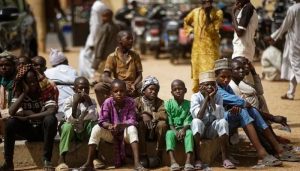By Cynthia Ezekwe
With Nigeria’s population growth continuing to outpace poverty reduction and persistently high inflation, the number of Nigerians living below the national poverty line is expected to rise by 13 million between 2019 and 2025.
The World Bank made the projection in its latest report tagged “Macro Poverty Outlook for Nigeria: April 2023.
The international financial institution noted that Nigeria is in a more fragile position than before the late 2021 global oil price boom, adding that growth and poverty reduction have further been affected by cash scarcity in the context of the naira redesign.
According to the report, the deteriorating economic environment in the country had pushed millions of Nigerians into poverty, while stating that risks are tilted to the downside given the lack of macro-fiscal reforms, the naira demonetization, and an uncertain external outlook.”
It also pointed out that the cash scarcity created by the Central Bank of Nigeria (CBN) naira redesign policy hampered the country’s economic growth and poverty reduction efforts, adding that about 13 million Nigerians would become poor between 2019 and 2025.
The World Bank further stated that the economy is projected to grow by an average of 2.9 per cent per year between 2023 and 2025, only slightly above the population growth rate of 2.4 per cent. It added that growth will be driven by services, trade, and manufacturing.
Commenting on the country’s deteriorating fiscal position,the report stated that the Nigerian government spent 96.3 per cent of its revenue on debt servicing in 2022 with the constant fiscal deficit worsening the country’s public debt stock.
”In 2022, the cost of the petrol subsidy increased from 0.7 per cent to 2.3 per cent GDP. Low non-oil revenues and high-interest payments compounded fiscal pressures. The fiscal deficit was estimated at 5.0 per cent of GDP in 2022, breaching the stipulated limit for federal fiscal deficit of three per cent. This has kept the public debt stock at over 38 per cent of GDP and pushed the debt service to revenue ratio from 83.2 per cent in 2021 to 96.3 per cent in 2022,’’ the report said.
It further explained that oil price booms which have previously supported the Nigerian economy have been on the contrary side since 2021, while noting that macroeconomic stability has weakened amidst declining oil production, costly fuel subsidies, exchange rate distortions, and monetization of the fiscal deficit.
The Washington-based bank also noted that macroeconomic stability has weakened considerably due to multiple foreign exchange rates (FX), high and increasing inflation, rising fiscal pressures, and declining forex reserves.
“Persistent structural economic issues (volatile growth, low private investment, low and inefficient public spending, due to low revenue collection, and low social development outcomes leading to low productivity) have prevented any meaningful acceleration of growth. Insecurity remains widespread, with more violent conflict events occurring across the country, adversely impacting private investment and growth,’’ the report added.









The case for government’s engagement in business